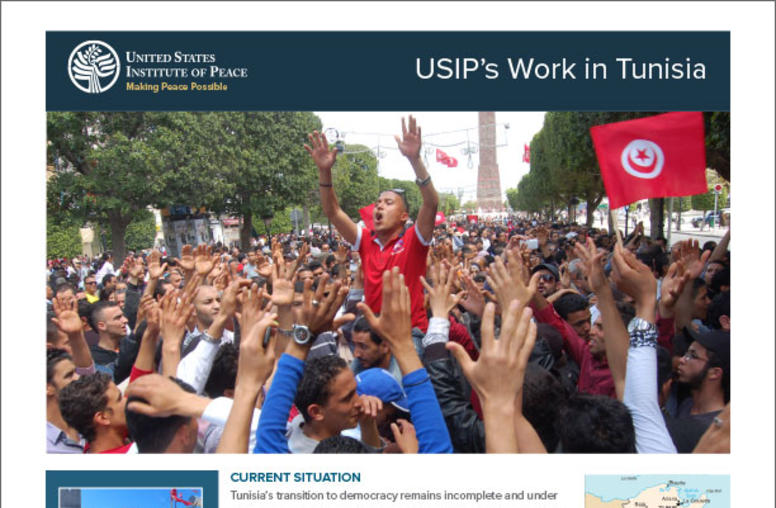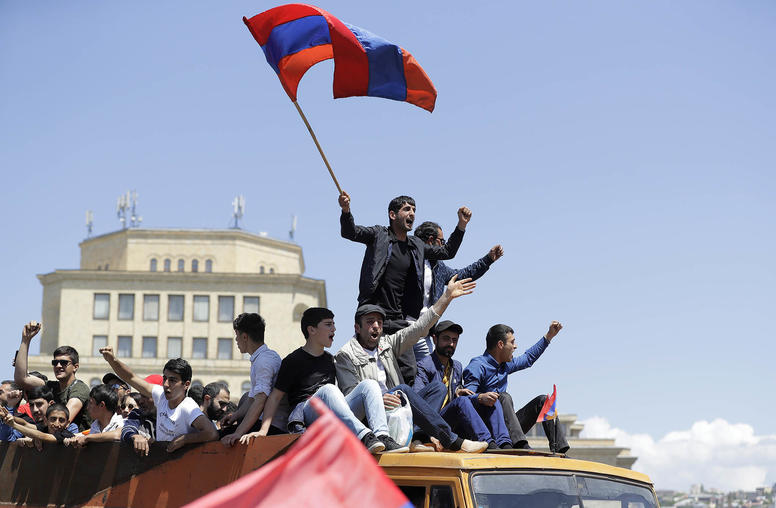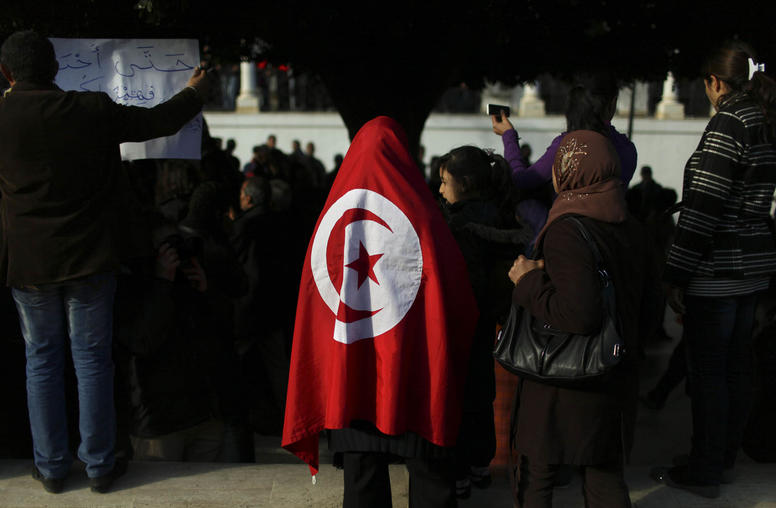A Democratic, Islamist Tunisia?
Dan Brumberg, Senior Adviser for the Center for Conflict Management discusses the recent democratic elections in Tunisia.
October 26, 2011
Dan Brumberg, Senior Adviser for the Center for Conflict Management discusses the recent democratic elections in Tunisia.
- On October 23, Tunisia held elections for a Constituent Assembly. What is the significance of these elections, for Tunisia itself, as well as the wider Arab region?
- The fact that an estimated 90% of the registered voters participated in elections provides reason for optimism, no?
- What about the role and influence of Islamists in a new democratic Tunisia?
- What do you believe will be the most important factors shaping Nahda’s policies?
- Nelson Mandelas are rare indeed: what other factors might come into play to help promote democratic consensus building in Tunisia?
On October 23, Tunisia held elections for a Constituent Assembly. What is the significance of these elections, for Tunisia itself, as well as the wider Arab region?
These elections are being closely watched throughout the Middle East and are likely to influence other efforts to advance democracy in the Arab world. After all, Tunisia’s January 2011 “Jasmine Revolution,” set off a chain reaction of political rebellion throughout the Middle East, first in Egypt, and then in Yemen, Libya and Syria. These events created hopes throughout the region for a new democratic future. Thus far, however, these aspirations have not been met. Egypt’s transition has been closely controlled by a military that seems bent on reasserting a large measure of power. Libya has gone through months of bloody conflict that resulted in the death (and perhaps the execution) of a dictator. But it remains to be seen whether the opposition can unite behind a clear democratic agenda. As for Yemen and Syria, they are sinking into civil conflict. Under these trying circumstances, a successful democratic election in Tunisia would provide a much-needed example of what can be achieved through non-violent political change. For the entire Arab world, little Tunisia carries great symbolic importance. Inside Tunisia, these elections will demonstrate whether the politically active population attributes real legitimacy to an on-going experiment in political reform, and whether, in turn, the country’s leaders are capable of leading this process forward in a constructive manner. The challenge is considerable. It is important to remember these elections were organized first and foremost to create a body that would be responsible for creating a new constitution. However, the resulting 217-member assembly, which will have a year to carry out its main mandate, must also function as Tunisia’s first, democratically elected transitional government. It must elect a president, and in a broader sense, it must provide the institutional and legal framework for a series of related reforms, not least of which are reforms in the economic and social spheres. After all, the revolution began in a rural, underdeveloped region that had not benefitted from the economic boom that has transformed Tunis and the coastal region. That rebellion then came to Tunis and was embraced by a professional middle class, a portion of which had previously made its peace –or at least had tacitly supported—former president Ben Ali’s dictatorship. The challenge now is to bridge the political and social divide between these “two Tunisias.” Whether a temporary parliament, whose primary mission is to write a constitution can also find ways to begin to tackle this enormous task, is an open question.
The fact that an estimated 90% of the registered voters participated in elections provides reason for optimism, no?
Yes indeed, it is a remarkable achievement, one that will resonate throughout the region. This extraordinary rate of participation, however, also underlines the expectations of the country’s youthful population. They will look for real, tangible results and if those results are not forthcoming, they may take to the streets again. Managing expectations is a formidable challenge.
What about the role and influence of Islamists in a new democratic Tunisia?
That is a crucial issue, and in some respects perhaps the most important one. The Nahda (Renaissance) Party appears poised to win at least 45 percent of the vote—and perhaps even more if you add other smaller Islamist parties. It would be no exaggeration to say that Tunisia’s democratic future will hang on what the party’s leaders say, and most importantly, do. On this score, the urban professional and business community, particularly those in these two sectors that favor a more secular orientation, will surely greet the results of the elections with a large measure of concern, and even fear. Many secular Tunisians assert that in the last few months the Nahda Party used a “double language” – attempting to reassure secular Tunisians of its commitment to pluralism and individual rights, while at the same time signaling its more traditional or populist base of its loyalty to Islamic law and tradition. This kind of strategic ambiguity – as some Tunisians see it – suggests the possibility that Nahda’s pluralist professions might have been a mere tactic to attain power democratically. The question is whether, having done so, the party will seek to use a popular mandate to reach out to other non-Islamist parties, or whether instead, it will invoke its mandate to impose an Islamist agenda that a not insignificant plurality of Tunisian society opposes or fears.
What do you believe will be the most important factors shaping Nahda’s policies?
First and foremost, I do not believe that merely because Nahda is an Islamist party it is incapable of leading Tunisia into a democratic future. Nor, for that matter, am I surprised that the party used diverse – and at times conflicting – messages to mobilize different constituencies. This is a phenomenon hardly unique to so-called Islamist politics. One only needs to look at our own democracy and to find a similar dynamic. That said, in the context of a transition in which the potential losers of the election fear that their own political and social rights may suffer, it is the duty of the winning party to take clear measures designed to reassure the losers that new democracy will protect everyone’s rights. Whether Nahda’s leaders can meet this challenge remains to be seen. During my September visit to Tunisia, and in my discussions with Nahda leaders, I got a clear sense that many in the party understand this challenge. But like many Islamist parties, Nahda has many currents. It will not be easy for the moderate current to prevail while maintaining credibility with the party’s youthful base. This will be a tricky balancing act, particularly given the rising influence of a very small but influential current of “Salifiyya” Islamists. The latter has little desire to compromise. Indeed, many of its leaders have questioned the Islamist credentials of Nahda itself. If Salifist leaders call their followers into the streets, Nahda will be under huge pressure to demonstrate its Islamic “authenticity” or (asala in Arabic). We saw this destructive dynamic in early October, when Salifist leaders mobilized their supporters—sometimes violently – to oppose the broadcasting of Persepolis, an animated film that they deemed offensive to Islamists. Nahda’s response to these events illustrated the conflicting pressures it must contend with: on the one hand, party leaders denounced the use of violence and insisted that their members had not joined the protests. On other hand, they denounced the film as a “form of prostitution.” In fact, Nahda leader Rashid al-Ghannouchi insisted that the demonstrators “remain the only defenders of Islam.” Now that his party has won a large plurality – and quite possibly a narrow majority – you can be sure that Salafists once again will be emboldened to put the squeeze on Nahda. It will take tremendous courage and vision to resist this kind of populist maneuvering. Tunisia will need someone like a Nelson Mandela to accomplish this.
Nelson Mandelas are rare indeed: what other factors might come into play to help promote democratic consensus building in Tunisia?
The most important factor will be the distribution of seats in the constituent assembly. If non-Islamist parties can win a significant plurality, say at the least 35 percent, Nahda will have a clear incentive to create a multi-party power sharing government. Such a government will be well positioned then to appoint a smaller, constitution-drafting committee. If the latter is led by legitimate experts in constitutional law, and at the same time includes a membership that is broadly representative of all the main political currents, then those voters who fear that they will be disenfranchised in a democratic Tunisia will probably be reassured – or at least will have reason to give this government a chance. It is important to remember one crucial fact: under the previous regime, Tunisia’s government acted as a kind of protection racket that gave a measure of political and social protection to the urban secular intelligentsia and business sectors. The question now is whether a new Tunisia can put in democratic protections that promise inclusion rather than exclusion. In that regard, I am encouraged by the on-going discussions about forming a coalition government of Islamist and secular parties. If this succeeds, Tunisia will offer an inspiring model for the entire region.
Explore Further
- Countries and Regions: Tunisia
- Eye on the Middle East and North Africa
Experts from the U.S. Institute of Peace (USIP) are closely following developments throughout the Middle East and North Africa. In a series of reports and interviews, they cover a wide range of issues.



